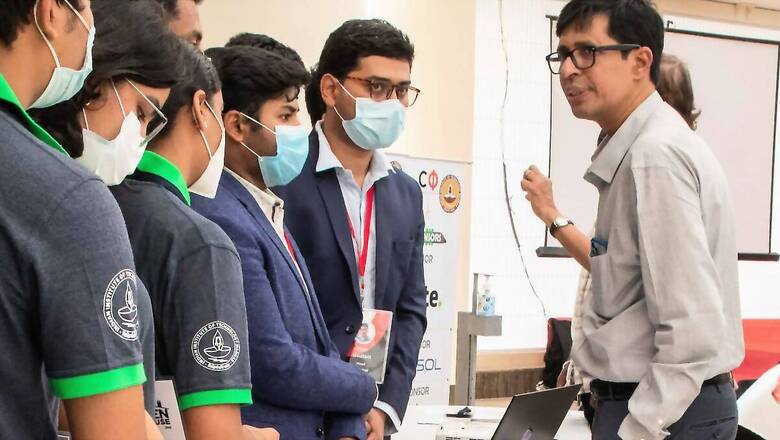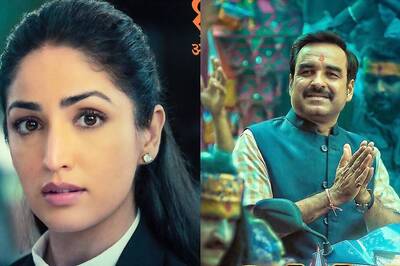
views
From offering online/hybrid degree courses to making engineering education more accessible to all, opening its first international campus, what makes IIT-Madras a top-ranking institution in the country, beating other IITs and the likes of IISc year-on-year?
In an interview with News18, IIT-Madras director Prof V Kamakoti speaks about the “strategic and fixed goals” that keep the institute ahead of others, how “fuelling start-ups in core areas” can help India, the challenges being faced in tech education, why the institute has not made it to the top 200 global rankings yet, identifying reasons behind student suicides on campus and how to equip them to deal with stress.
Prof V Kamakoti, remains an academician, who quit his corporate job to teach at IIT-Madras. A cyber-security expert, he became the institute’s director in January last year.
Q. IIT-Madras has retained its position as a top-ranking institution in the country in the ‘overall’ category for the fifth consecutive year and even among engineering institutes for eighth consecutive year in the NIRF rankings 2023. What is it that has kept the institute ahead of other IITs and universities such as IISc?
A. It is a cohesive effort that has worked with things falling in the correct place under all five parameters of the rankings — teaching-learning effectiveness, student strength, graduation outcomes, diversity, and inclusivity. This cohesiveness comes from a strategic plan that we have made each year with fixed goals and we have been aligning to this plan. Each of these goals have a contribution to these parameters. In terms of these goals, first is that we want to become more inclusive to make IIT-M accessible to all, which is one of our flagship programmes. In this context, we are opening up several hybrid courses such as BS in data science and BS in electronic systems, which we have already started. As a goal, we plan to offer three big online courses over the next five years.
Q. How do online/hybrid courses work? Are these full-fledged programmes and how do they fare in terms of career prospects for those doing a degree course online?
A: For an online or hybrid course to stabilise, it takes two to three years. We will shortly be starting another such programme on the sciences side. The most important help we have received from the University Grants Commission (UGC) is that it has allowed dual degree programmes where people can pursue two degrees at the same time provided that the time-tables don’t clash. These are full-fledged courses with multiple exits and our faculty is involved in teaching these. Those who complete four years get a BS degree. The final exams for these courses are in the proctored mode, which means that they have to come to a centre to write the exam and cannot write it at home.
Now, we have several students in these hybrid courses, for example, those who are pursuing civil or electrical engineering from another college, but are studying data science here. So, it’s a great combination because we need core commerce graduates with data science knowledge, we need core civil engineering people with electronic systems knowledge. This is because today for building automation and maintenance, you need different kinds of electronic systems as there are many dimensions of structural engineering. We have found in our evaluation that when we do an offline course, we get a bell curve. A bell distribution means very less people in the high and low ends with a higher number of people in the middle. Here when we see our grading system, it exactly fits a bell curve, which means that we are doing the evaluation in the right way.
Q. What about the hands-on-knowledge required for online engineering courses?
A: We have a commitment to take our student strength to 50,000, which means around 12,500 students that are on campus, and we target another 37,500 on the online platform across India, which currently is 22,000-23,000. For example, for hands-on-knowledge in electronics, which requires lab kind of exposure, there are kits developed at the institute that can be availed of by students for an economical cost, with which, they can do experiments at home, which too are monitored by the instructors. For those who cannot, there is equipment available at Swayam centres (opened across country by the Ministry of Education to facilitate resources, for teaching-learning online courses) which students can easily make use of. There are a lot of instructors including industry professionals guiding the students in the same. These are well-administered courses, which the institute already has experience in since we have been working on Swayam platform for almost a decade.
Q. Even though IIT-M has topped the rankings at home year after year, it has not made in the top 200 of the global rankings. Is there a conscious effort to reach up the global rankings as well?
A. There is no doubt that global rankings are equally important, but their parameters are very different from those in NIRF rankings. We participate in the QS World University rankings and there is a conscious effort to improve on the parameters that are under our control. A large part of the world rankings is based on perception and surveys, which we do not have a control on. But things such as publications in A-star journals and internationalisation, among others, we are consciously putting efforts to improve upon.
Q. You said internationalisation. Could you elaborate on the same?
A. We are almost ready to open a branch campus of IIT-Madras at Tanzania, which will be located in Zanzibar. It will be the first international campus of any IIT so far, which is likely to take off this October. We go to a place where they need us. Africa needed a big campus of this nature. Plus, their school education set up is good, so we will get students with a lot of potential. The faculty will also be from there itself. We are starting here with courses like BS in Data Science and AI; and BS in Electronic Systems and another course in marine engineering. Meanwhile, we are also getting PhD students from Tanzania to IIT-M, train them here and post them back to the home country. Both the governments have agreed and we have identified a temporary campus to start off with while we have been given a 300 acres-plus to build a permanent campus.
Q. Given that the government is about to allow foreign university campuses in India, do you think these will cater to the huge demand especially since so far the draft regulations say that they will have autonomy in terms of deciding fee structure?
A. Running an institution in India has its own DNA. I am sure these institutes will offer such kinds of scholarships and other such programmes. I think there is a huge demand in India for quality education, not just in engineering but other disciplines as well. There are 14.50 lakh students who appear for JEE (Mains), of which, 2.75 lakh qualify for JEE-Advanced. Of those, who clear Advanced, around 20,000 are selected for IITs, then another 50,000 get seats in the National Institute of Technology (NITs), but the remaining go to other institutions. A number of colleges in states and even self-financing institutions have come up well. So, the entry of foreign campuses will only add to the education opportunities in the country.
Q. The NIRF rankings report highlighted that trained faculty in engineering such as those holding doctorates are limited to just the top 100 institutions in the country? How is this impacting engineering education and what are the reasons behind this?
A. There are two aspects of research and teaching. So, for being a good teacher, I must have my fundamentals clear, but to add more to a subject like we say in Carnatic music to teach your ‘kirtan’ and then have your ‘manodharma’ (improved music – a distinguished feature of Carnatic classical music). In simple terms, it means that there is a song per say, then it is refined into an ‘alaap’ and then to ‘swara prasthara’, which is how Carnatic music is organised. Now, to just be a teacher you can just teach the ‘kirtan’ part, which is fixed. But, to enthuse the student to do ‘alaap’ and ‘swara prasthara’, that needs a research mindset. You need a faculty, who have done research to teach to this level.
Today after finishing B. Tech, people get good jobs, but those pursuing M. Tech are few, and the number of students taking GATE (Graduate Aptitude Test in Engineering) for masters is itself decreasing. All M. Tech students are placed well. For PhD, by the time a student is 25-27 years of age, there are social and financial constraints for many, especially for female students. Then, those who do complete PhDs get good jobs outside in the industry at high pay packages and they move out while not opting for teaching jobs. Those who come back to teaching after industry experience take several years. Over the past five years, I have lost six faculty members to such industry jobs. This is the challenge being faced at present. Unless a person has gone through this rigour of PhD and to a level of creativity, you can’t be a great teacher.
Q. When it comes to placements and students opting for disciplines, it is mostly computer science and emerging technologies that find the most takers while core disciplines are not among the top choices anymore? How important is this a concern and what could be done about it?
A. In my view, it’s a grave concern that not many students want to opt for core disciplines or jobs in these areas. I am really worried. Look at the number of development projects that are happening in the country, the way aviation and telecom sectors are growing. There is a need for people who understand the technology. We are doing a 5G campus trial on campus. Just yesterday, we had 5G towers set up here and there are certain aspects that are phenomenally mathematical. No AI specialist can solve that problem. To understand the spectrum, how to configure it, what are the licensing conditions, there is so much in a growing thing like 5G today that needs these field experts.
But the point is that we cannot force anyone to take up a particular job, as its about perception again. Today, jobs are dictated by how is the work environment and the pay package, which certainly make computer science and AI the top choices. The salaries are enormous and one can work from anywhere in the world or from home or their kitchen. At the same time, students must look at the core disciplines, which are going to give them stable jobs. For instance, if I am pursuing an engineering course and I take up a job at a software company and there is no connection between the course and the software work that I am doing, then I will be the first to be thrown out of the company during a lay-off. So, what we are doing at IIT-Madras is that we are encouraging students for entrepreneurship to pursue an idea in their core discipline and nurture it.
The pay package and ease of living versus my company and my idea, I see a paradigm shift here. So, the government and private institutions and corporates must help aid start-ups and invest Rs 30-40 lakh while take equity back, it is a high-risk, high-return thing. Of 100 such ventures, 20 will become good companies, two may become unicorns and so on. Fuelling start-ups in full core jobs is the way forward.
Q. There have been a series of student suicides at IIT-M in a short span of time. Does it impact the institute’s reputation? What do you think are the underlying reasons in such cases and what preventive measures are being taken by the institute for the same?
A. More than reputation, I am bothered about the student and the family. When it comes to a life, it cannot be equated with anything else. Every such incident has shattered me. We are the most affected with five such suicides within six months. We have found many reasons in our mental health survey including personal, health, financial and academic. Any of the first three can lead to academic stress. We have identified independent counsellors on campus, who come from outside so that students while approaching them do not have any stigma attached. We are also getting parents to give them emotional support on a regular basis. So, happiness is a collective responsibility is what we have learnt in a nutshell. Over the past two months we are slowly stabilising and found that the efforts being made are yielding some results. We realised we have some sort of a stress situation, which requires regular conversation so we have people who are ‘listeners’ on our mental health website – ‘Be Happy’. Stress is not limited just to IITs, everyone has to equip students to handle it.




















Comments
0 comment